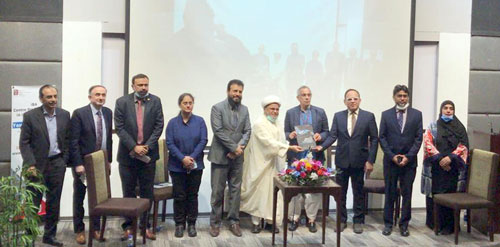Muslims worldwide spent S$2.02 trillion in 2019 on halal lifestyle-related food, this was stated by CEO, Halal Development Council (HDC), Asad Sajjad. Speaking at a seminar held at IBA along with HDC (Halal Development Council) Pakistan and in partnership with Dinar Standard, a US-based research, and advisory firm hosted a Pakistan launch event of the State of the Global Islamic Economy Report (SGIE) 2020/2, the other day. Theme of the event was ‘thriving in uncertainty’. Launched in 2013, the eighth edition of the report is supported by Dubai Islamic Economy Development Centre (DIEDC) and presents an annual update on the Islamic Economy – encompassing halal products, Islamic finance, and lifestyle sectors and services. Muslims spent huge amounts on pharmaceuticals, cosmetics, modest fashion, travel, and media sectors. While this spending reflects 3.2 percent year-on-year growth, Muslim spending in 2020 is forecast to contract by 8 percent due to the impact of the pandemic. However, spending, excluding travel, is forecast to rebound by the end of 2021 and is slated to reach S$2.3 trillion by 2024, at a cumulative annual growth rate (CAGR) of 3.1 percent. Islamic finance assets are estimated to have reached S$2.88 trillion in 2019 and are estimated to remain at the same level in 2020. Pakistan’s domestics Muslim consumer spend on halal relevant sectors was estimated at $120 billion in 2019 which is the 6th highest globally. In the report’s Global Islamic Economy Indicator that covers 81 countries this year — Malaysia, Saudi Arabia, the UAE, Indonesia, and Jordan lead the rankings. Pakistan moved up one rank to take the #8 spot. Dr Ishrat Hussain, Advisor to PM on Institutional Reforms & Austerity, stated that a valuable contribution has been made by issuance of this report. He further mentioned that 80% of the Halal market is held by non-OIC countries and that we should ask this question why is this happening. He further mentioned Pakistan is lacking behind in halal market due to the following reasons: In his welcome speech, the Executive Director IBA Dr. S Akbar Zaidi said that IBA CEIF was setup in Dec 2015 with the help of State Bank of Pakistan to promote Islamic banking and finance. Now the Centre is also working to promote the halal economy. IBA has launched its MS Islamic Banking and Finance in 2017 to provide human resources to the Islamic finance industry. IBA CEIF provide trainings to industry professionals, Shariah scholars, and board members of financial institutions. Lately, the Centre conducted seminars on halal food and research on halal industry prospects in Pakistan. The First Islamic Finance country report of Pakistan was published by IBA CEIF in collaboration with IRTI and Thomson Reuters 2016. First NBFI and Modaraba Sector country report 2020 will be launched next month. This report is written by IBA CEIF and NBFI & Modaraba Association of Pakistan Ahmed Ali Siddiqui, Director, Center of Excellence in Islamic Finance, Institute of Business Administration (IBA-CEIF), said that the total volume of Islamic economy is estimated at USD 5 trillion with a major share of Islamic finance which is around USD 2.8 trillion. Moreover, Islamic finance is the common platform for all the sectors of Islamic economy including food, pharma, media, tourism because it is important that all these industries are obtaining financing in a Shariah compliant manner. Asad Sajjad, CEO, Halal Development Council (HDC) Pakistan, said: “The global halal food, pharmaceuticals and cosmetics is at $255 billion in exports and presents Pakistani exporters with a tremendous opportunity to tap into. Currently, our exports in this segment are a mere $2.6 billion (2019) which is only 1% of this opportunity. With a strategic focus on these export markets, we can certainly grow our exports. Modest fashion sectors is another area where Pakistani exporters can expand into.” Abdulla Mohammed Al Awar, CEO of Dubai Islamic Economy Development Centre (DIEDC), said: “The SGIE Report is an annual publication that has gained traction as a trusted and ready reference on the global Islamic economy, and contributes to strengthening Dubai’s position as the global capital of Islamic economy. In these uncertain times, the Islamic economy, with its ethical and transparent ecosystem, remains a pillar of strength and a guarantee for a better future.”










